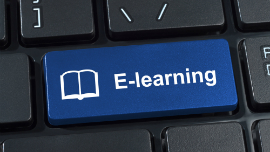On 25-26 November, the Council of Europe HELP Programme and its key partners in Morocco, the Higher Institute of the Judiciary and the Presidency of the Public Ministry, organised in Rabat the first cross-border launch of the HELP course on Violence against Women and Domestic Violence.
This event took place in the framework of the programme "Ensuring Sustainable Democratic Governance and Human Rights in the Southern Mediterranean" (South Programme III), a joint programme between the European Union and Council of Europe open to southern Mediterranean partners covered by the Council of Europe's Neighbouring Regions Policy. In addition, the EU and the Council of Europe joined forces to launch the campaign 16 Days of Activism against Gender-Based Violence (25 November-10 December) for the year 2019.
Participants from Morocco, Tunisia, Lebanon, Egypt and Palestine * were welcomed by Mr Abdelhanine Touzani, Acting Director General of the Higher Institute of the Judiciary, Mr Mounir Bensalah, General Secretary of the National Council of Human Rights, Ms Zhor El Horr, President of the National Commission for the Protection of Women Victims of Violence, Mr Mohamed Oukhlifa, representative of the Presidency of the Public Ministry, Mr Michael INGLEDOW, Head of the Council of Europe Office in Morocco and Mr Philip Mikos, Minister Counsellor, Head of Cooperation at the Delegation of the European Union in Morocco. The latter emphasized the need to pursue transversal ‘4-Ps’ efforts: prevention, protection, prosecution and “prise en charge”.
Ms Eva Pastrana, Head of the HELP Unit, introduced the Council of Europe HELP Programme highlighting the importance of this cross-border launch of a HELP course in Rabat, whose face-to-face session will be followed by tutored versions of the national (Tunisian and Moroccan versions) for over 3 months. She also encouraged and moderated exchanges among legal professionals (judges, prosecutors and lawyers) coming from different countries of the South Mediterranean region, many of whom are passionate advocates skilled on the topic of Violence against Women and Domestic Violence.
Representatives from participant countries (Morocco, Tunisia, Egypt, Lebanon, Palestine*) presented the current challenges and prospects concerning Violence against Women and Domestic Violence in their national contexts.
Ms Carmen Morte Head of Division in the European Court of Human Rights (responsible for ECtHR lawyers from Andorra, Azerbaijan, Latvia and Spain) presented the most relevant case law of the European Court of Human Rights on Violence against Women and Domestic Violence, underlining the fact that violence against women is not only a serious violation of human rights but also a form of discrimination against women.
The Council of Europe Programme for Human Rights Education for Legal Professionals (HELP) platform was presented by Ms Ana-Maria Telbis, HELP Project coordinator of “HELP in the EU”.
Mr Samir El Ghalmi, HELP tutor and coordinator of the working group in charge of developing the national version of the HELP course on the fight against Violence against Women, introduced the Moroccan version of the course while for Tunisia, Ms Donia Allania, HELP tutor and coordinator of the working group presented the Tunisian version of the course.
The HELP course on Violence against Women and Domestic Violence explains how these types of violence are addressed in the international and European legal framework, focusing in detail on the first international legally-binding instrument on this topic, the Council of Europe Convention on preventing and combating Violence against Women and Domestic Violence, known as Istanbul Convention and provides an overview of the relevant case-law of the European Court of Human Rights. It allows legal and other professionals to improve their knowledge and skills on the existing standards in this area and to apply them in their daily work.
The HELP course on Violence against Women and Domestic Violence is available on the HELP online platform in English, Bosnian, Ukrainian, Russian, Slovenian, Armenian, Georgian, Macedonian, and Montenegrin and will be available soon in Arabic, Italian and Spanish, with more to follow in 2020.
The course covers the following topics:
- Understanding violence against women and domestic violence
- International and European Legal Framework
- Overcoming barriers / access to Justice
- Criminal Justice Response I – Investigation and pre-trial
- Criminal Justice Response II – Trial and sentencing
- Civil Justice Response
- Alternative Dispute Resolution

Group photo from the first Council of Europe HELP course launched in the Southern Mediterranean. © Council of Europe
Council of Europe HELP course Violence against Women and Domestic Violence
* This designation shall not be construed as recognition of a State of Palestine and is without prejudice to the individual positions of Council of Europe member States on this issue.





